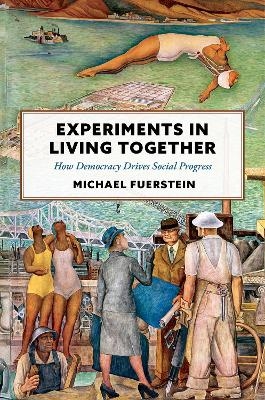
Experiments in Living Together
How Democracy Drives Social Progress
Seiten
2024
Oxford University Press Inc (Verlag)
978-0-19-778428-0 (ISBN)
Oxford University Press Inc (Verlag)
978-0-19-778428-0 (ISBN)
- Noch nicht erschienen (ca. Dezember 2024)
- Portofrei ab CHF 40
- Auch auf Rechnung
- Artikel merken
Michael Fuerstein explores how democracy drives social progress despite the potential ignorance and irrationality of democratic citizens, arguing that democracy enables "experiments in living": innovations in social practice that transform social emotions and identities and cultivate moral learning.
Over the past 70 years, the United States has undergone major moral shifts surrounding gender, sexual orientation, and race. Although these changes have been incomplete and imperfect, they nonetheless represent stunning improvements in the human condition which have been supported by democracy. While on its face democratic governance embodies the promise of protest, free expression, and social change, the recent surge of populism has provoked some cynicism about democracy and the potential ignorance and irrationality of democratic citizens. This debate raises questions around the role of democracy in social progress, democracy's definitive principles and ideals, and the tension between democracy's characteristic aspirations and the disappointing realities of real-world politics.
Michael Fuerstein addresses these questions, presenting a fresh philosophical account of social progress that focuses on democracy and delivering an innovative rebuttal to skeptics inspired by the recent populist wave. Following in the tradition of John Dewey, he argues that democracy enables progress through "experiments in living": innovations in social practice that transform social emotions and identities and cultivate moral learning.
Drawing on research in social psychology and several detailed historical case studies--same-sex marriage, women's integration into the workforce, and school desegregation--Fuerstein illuminates the critical role of novel experience in building community: linkages of emotion and identity across a democratic public, which enable diverse citizens to flourish together. Challenging technocratic views which imply that democracy is undermined by citizens' ignorance and incompetence, Fuerstein suggests that the remedy for democracy's contemporary malaise must target failures of community more than failures of knowledge or skill, a change which will require a new round of experimental innovations in social life.
Over the past 70 years, the United States has undergone major moral shifts surrounding gender, sexual orientation, and race. Although these changes have been incomplete and imperfect, they nonetheless represent stunning improvements in the human condition which have been supported by democracy. While on its face democratic governance embodies the promise of protest, free expression, and social change, the recent surge of populism has provoked some cynicism about democracy and the potential ignorance and irrationality of democratic citizens. This debate raises questions around the role of democracy in social progress, democracy's definitive principles and ideals, and the tension between democracy's characteristic aspirations and the disappointing realities of real-world politics.
Michael Fuerstein addresses these questions, presenting a fresh philosophical account of social progress that focuses on democracy and delivering an innovative rebuttal to skeptics inspired by the recent populist wave. Following in the tradition of John Dewey, he argues that democracy enables progress through "experiments in living": innovations in social practice that transform social emotions and identities and cultivate moral learning.
Drawing on research in social psychology and several detailed historical case studies--same-sex marriage, women's integration into the workforce, and school desegregation--Fuerstein illuminates the critical role of novel experience in building community: linkages of emotion and identity across a democratic public, which enable diverse citizens to flourish together. Challenging technocratic views which imply that democracy is undermined by citizens' ignorance and incompetence, Fuerstein suggests that the remedy for democracy's contemporary malaise must target failures of community more than failures of knowledge or skill, a change which will require a new round of experimental innovations in social life.
Michael Fuerstein is Professor of Philosophy at Saint Olaf College in Northfield, Minnesota. As a founding member of the Society for Progress, he also works regularly with executives and MBA students from around the world to help integrate business practice and societal progress. His work has received awards from the National Endowment for the Humanities, the Institute for Social and Economic Research and Policy at Columbia University, and the Center for Cultural Analysis at Rutgers University, among others.
| Erscheint lt. Verlag | 29.12.2024 |
|---|---|
| Verlagsort | New York |
| Sprache | englisch |
| Maße | 153 x 212 mm |
| Gewicht | 494 g |
| Themenwelt | Geisteswissenschaften ► Philosophie ► Ethik |
| Sozialwissenschaften ► Politik / Verwaltung ► Vergleichende Politikwissenschaften | |
| ISBN-10 | 0-19-778428-3 / 0197784283 |
| ISBN-13 | 978-0-19-778428-0 / 9780197784280 |
| Zustand | Neuware |
| Informationen gemäß Produktsicherheitsverordnung (GPSR) | |
| Haben Sie eine Frage zum Produkt? |
Mehr entdecken
aus dem Bereich
aus dem Bereich


